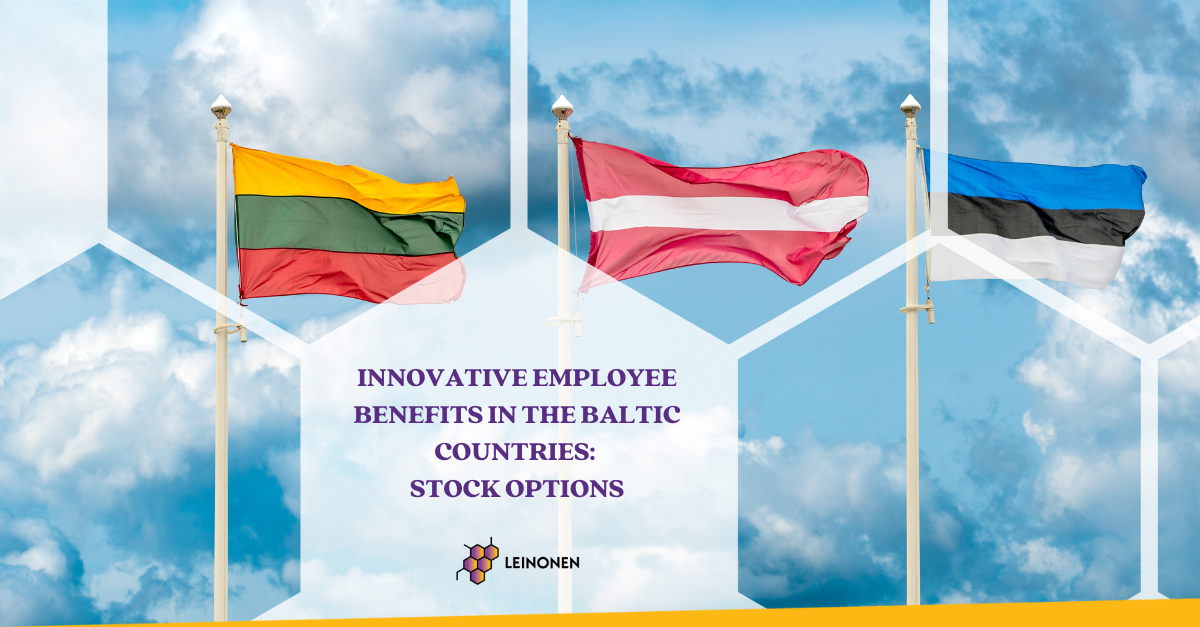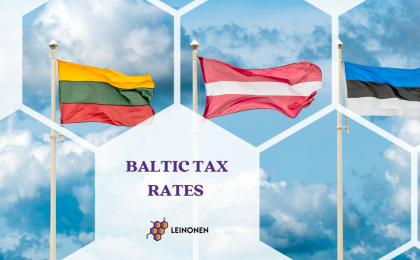The Baltic countries are witnessing a surge in innovative employee benefits as an increasing number of companies seek to attract and retain top talent. These benefits not only enhance employee satisfaction but also motivate higher performance. Among the most popular employee perks in the region are:
- Private health, life insurance,
- Full or partial compensation of health and sports expenses (e.g. participation fees in public sports events, gym membership etc.)
- Professional development (e.g. foreign languages training),
- Compensation for installation of workplace at home (as a second workplace),
- III pillar pension payments by the employer,
- Company stock options (employee option).
An employee option is a way of motivating employees, when an agreement is concluded between the employee and the employer, according to which the employee is given the right to purchase shares of the company he works for at a discounted price or for free at some point in the future.
Options are an excellent motivational tool that encourages effective contribution to the improvement of performance as the employee is given the right to become a shareholder of the company in the future. Options can give the employee the opportunity to buy a portion of a company’s stock for free or at a very low price (agreed price). The option contract gives the employee the right, but not the obligation to purchase the company’s shares in the future. At the end of the term specified in the option contract, the employee has the right to choose whether to buy the shares or not.
Please find a taxation overview of the options below.
| Lithuania and Estonia | |
| Options provided | Taxation |
| The company granted the employee stock options, which, according to the contract, the employee will be able to convert into shares (vest) no earlier than after three years. | At the time of conversion of options into shares (vesting), a tax exemption is applied, therefore, such benefits received by the employee are not subject to personal income tax and social security contributions. |
| The company granted the employee stock options, which, according to the contract, the employee will be able to convert into shares (vest) earlier than after three years. | At the time of conversion of options into shares (vesting), a tax exemption is not applicable, therefore, such benefits received by the employee are subject to personal income tax and social security contributions i.e. shall be taxed as employment related income. |
| Latvia | |
| Options provided | Taxation |
| The company granted the employee stock options, which, according to the contract, the employee will be able to convert into shares (vest) no earlier than after 12 months. | At the time of conversion of stock options into shares (vesting), payroll tax exemption is applicable if the stock options are granted according to the stock option plan and employer has submitted plan to the State revenue service and has ensured all law requirements. If requirements are not met tax exemption is not applicable, thus, such benefits received by the employee are subject to personal income tax and social security contributions i.e. shall be taxed as employment related income. |
| The company granted the employee stock options, which, according to the contract, the employee will be able to convert into shares (vest) earlier than after 12 months. | At the time of conversion of options into shares (vesting), tax exemption is not applicable, thus, such benefits received by the employee are subject to personal income tax and social security contributions i.e. shall be taxed as employment-related income. |
Additional comments about Lithuania
| If the shares are granted by a Lithuanian company |
| If the shares are granted immediately free of charge or at a lower price than the market price, it is recognized as income of the employee received as benefit in kind and shall be subject to personal income tax and social security contributions i.e. shall be taxed as employment related income. |
| Additional comments about Lithuania: |
| When acquiring shares from a foreign company (parent company of the employer), the above-mentioned tax relief may also be applied to the acquisition of such shares. However, in cases where shares are to be granted to employees immediately or earlier than after three years and if the parent company abroad bears all the costs related to the granting of shares, the value of the shares received by the employee would only be subject to personal income tax (obligation to pay personal income tax would occur to employee) and would not be taxed as employment related income (would not be subject to social security contributions). In cases where the costs related to the grant of shares were transferred to the direct employer, the employee would be obligated to pay personal income tax and the employer (Lithuanian company) would be obligated to calculated and pay the social security contributions. |
Additional comments about Estonia
| Option agreement signing format |
| In order to prove the date of conclusion of the agreement to the Estonian Tax and Customs Board, the option agreement needs to be signed digitally (preferably Estonian digital signature) or signed in front of a notary (confirmation of signature). Otherwise, the option agreement must be submitted to the Estonian Tax and Customs Board within 5 business days as of conclusion. |
| If the shares are granted by an Estonian company |
| If the shares are granted immediately free of charge or at a lower price than the market price, it is recognized as income of the employee received as benefit in kind and shall be subject to personal income tax and social security contributions i.e. shall be taxed as employment related income. |
| If the shares are granted by the parent company abroad |
| When acquiring shares from a foreign company (parent company of the employer), the above-mentioned tax relief may also be applied to the acquisition of such shares. However, in cases where shares are to be granted to employees immediately or earlier than after three years and if the parent company abroad bears all the costs related to the granting of shares, the value of the shares received by the employee would only be subject to personal income tax (obligation to pay personal income tax would occur to employee) and would not be taxed as employment related income (would not be subject to social security contributions). In cases where the costs related to the grant of shares were transferred to the direct employer, the employee would be obligated to pay personal income tax and the employer (Estonian company) would be obligated to calculated and pay the social security contributions. |
Additional comments about Latvia
| If the shares are granted by a Latvian company |
| If the shares are granted immediately free of charge or at a lower price than the market price, it is recognized as income of the employee received as benefit in kind and shall be subject to personal income tax and social security contributions i.e. shall be taxed as employment related income. |
| If the shares are granted by the parent company abroad |
| When acquiring shares from a foreign company (parent company of the employer), the above-mentioned tax relief may also be applied to the acquisition of such shares. Usually, shares are granted through local company, thus in order to apply exemption the same law requirements needs to be considered. In cases where the costs related to the grant of shares were transferred to the direct employer, the employer (Latvian company) would be obligated to calculated and pay the social security contributions if tax exemption cannot be applied. |







